2023届高中英语语法复习课件(共130张PPT)
文档属性
| 名称 | 2023届高中英语语法复习课件(共130张PPT) |  | |
| 格式 | zip | ||
| 文件大小 | 1.7MB | ||
| 资源类型 | 教案 | ||
| 版本资源 | 人教版(2019) | ||
| 科目 | 英语 | ||
| 更新时间 | 2023-04-12 20:54:47 | ||
图片预览

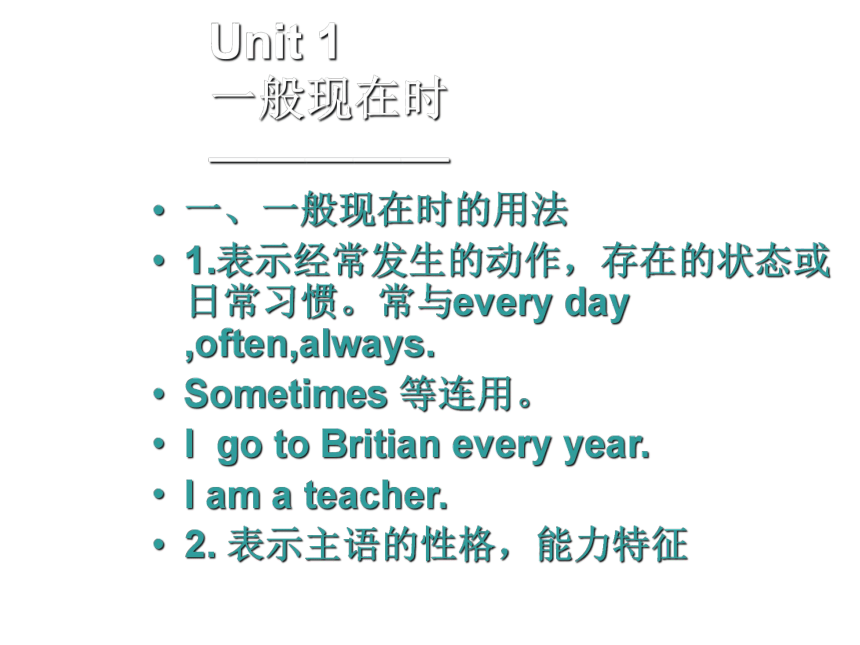
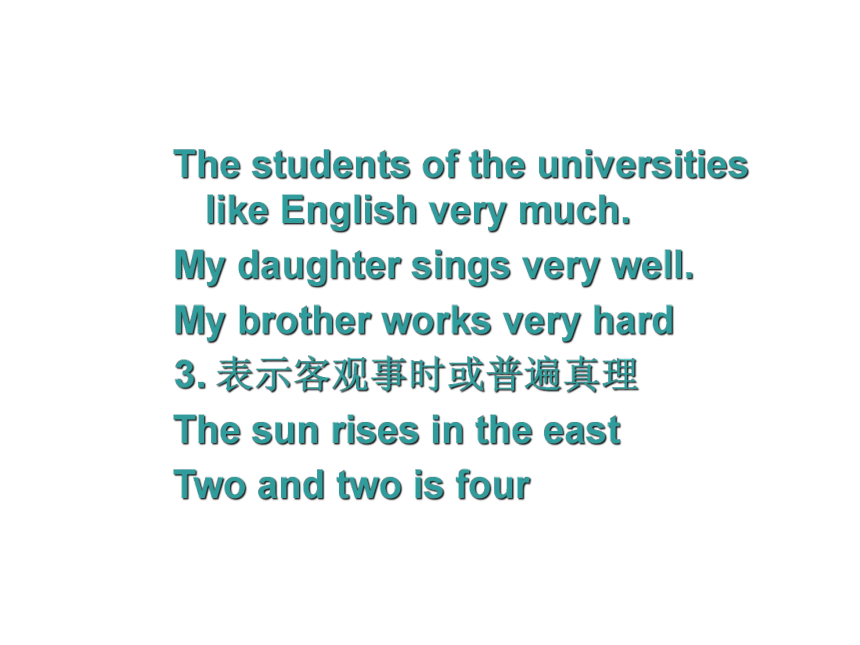
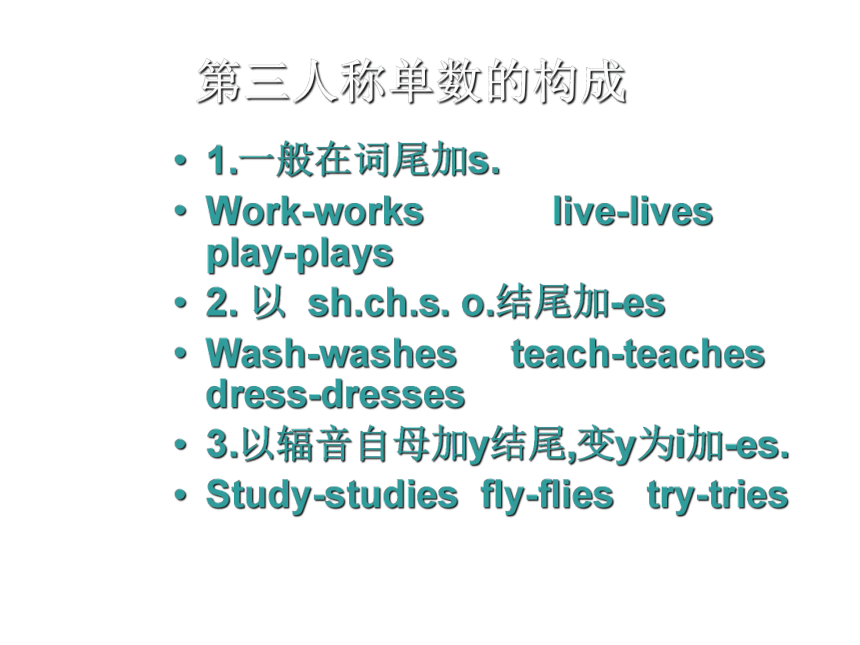
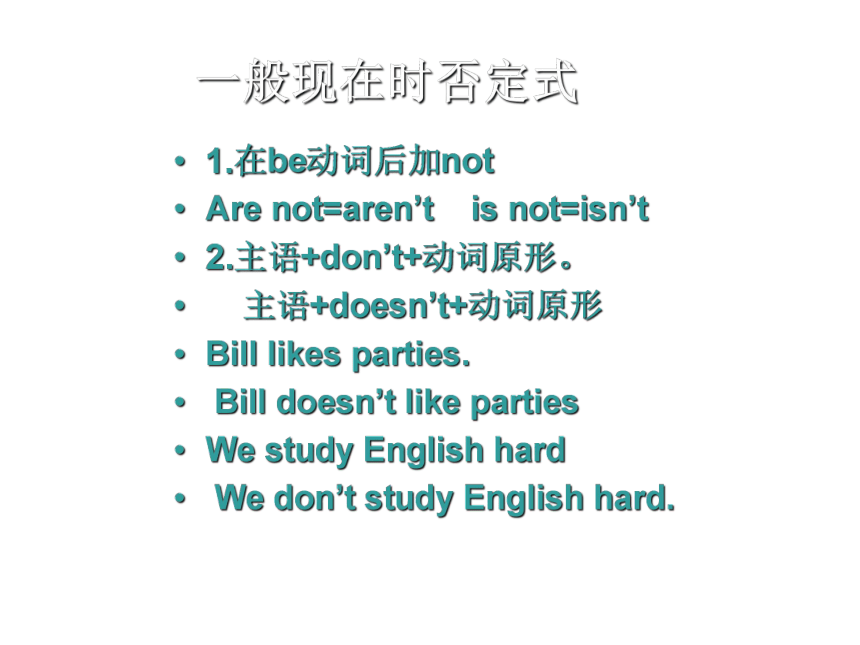
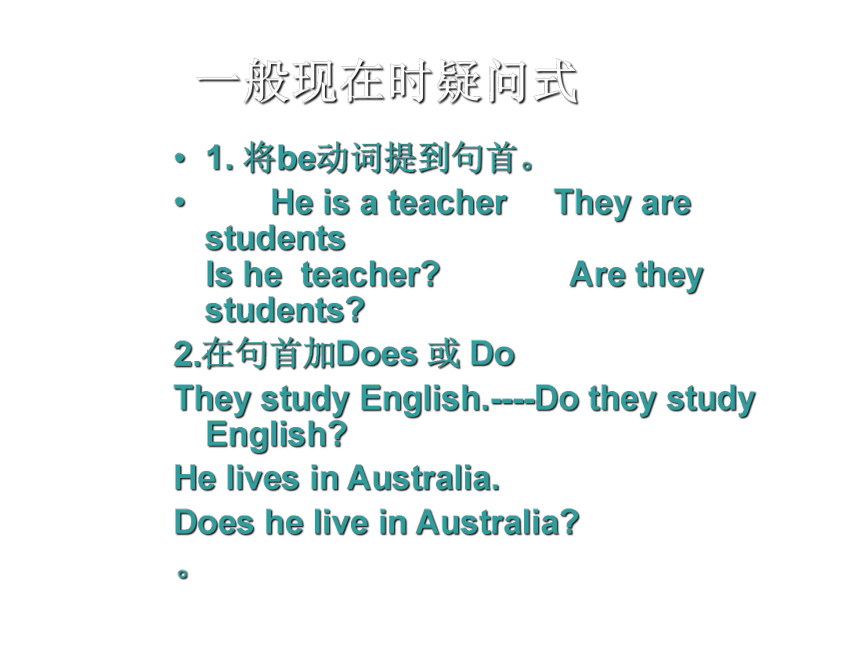
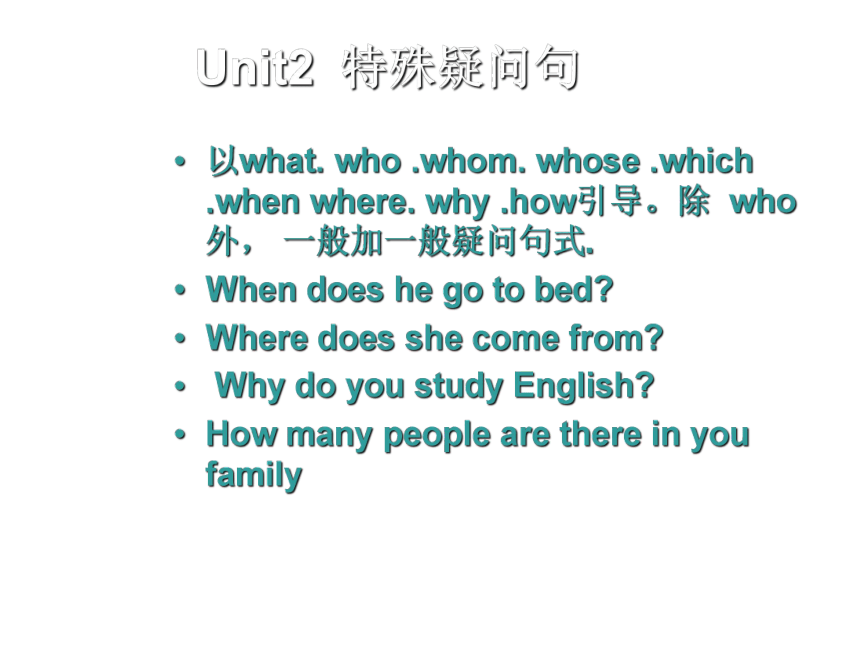
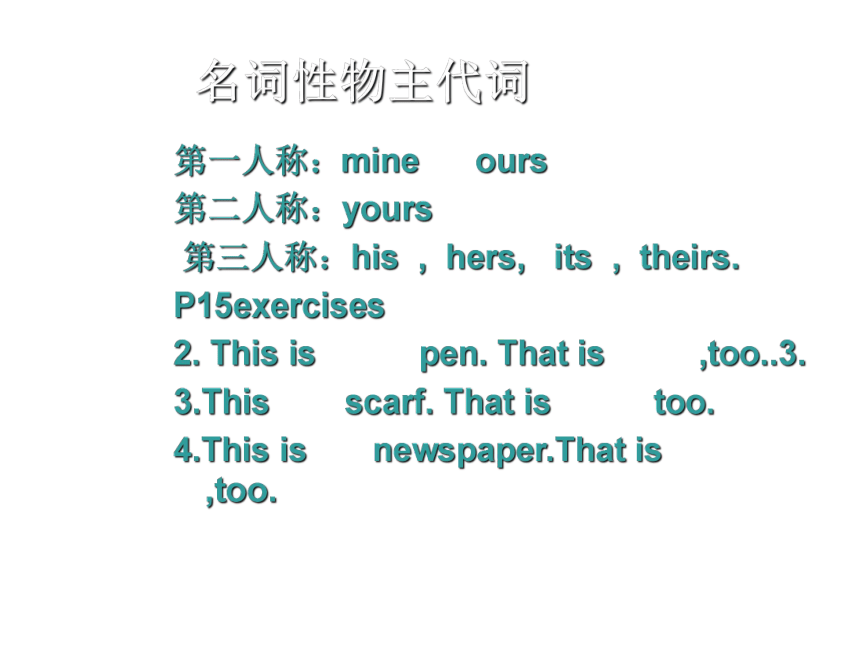
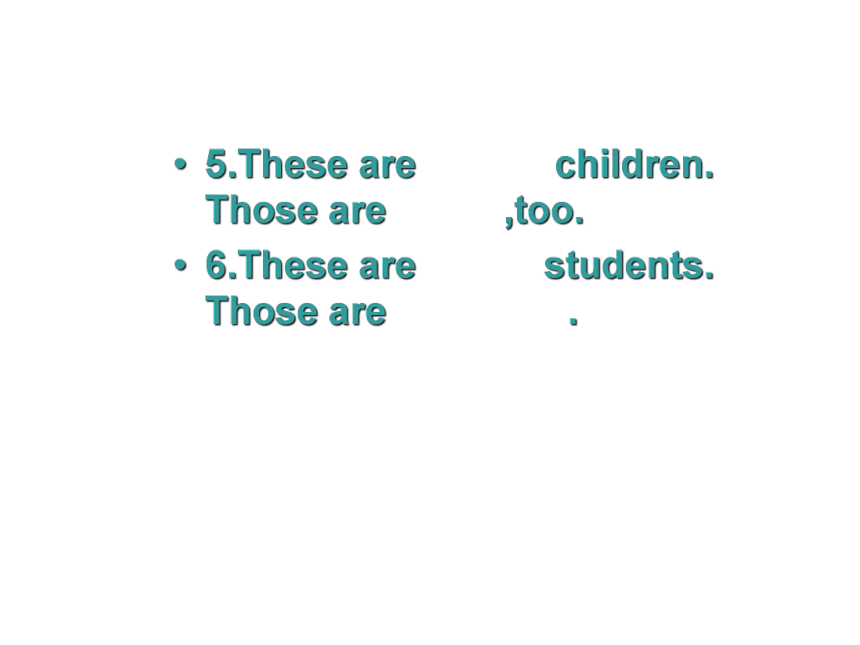
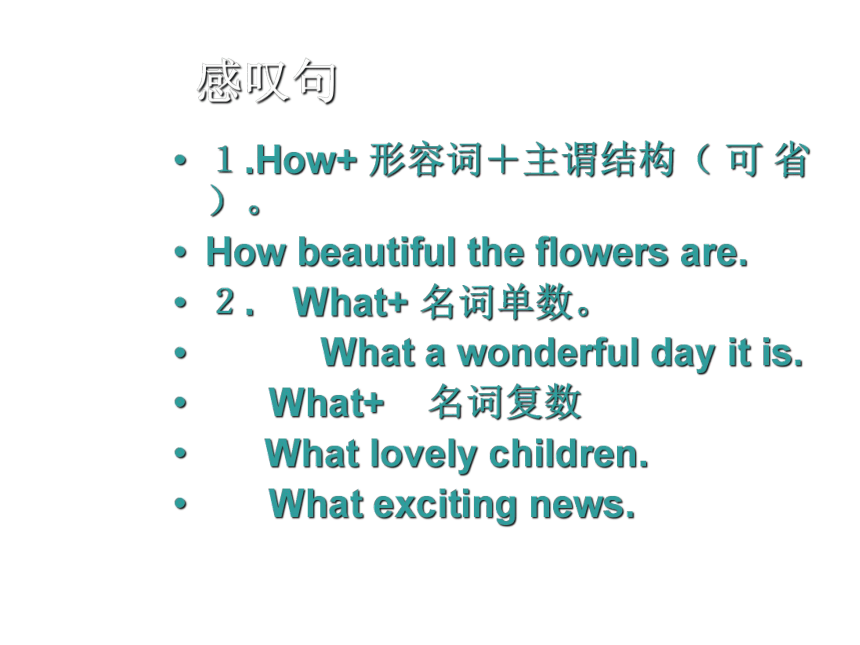
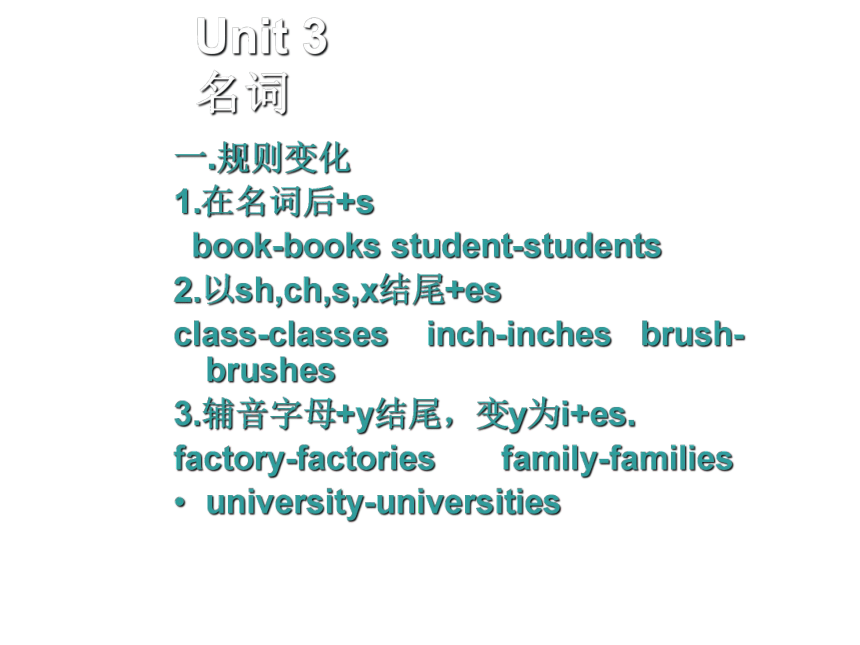
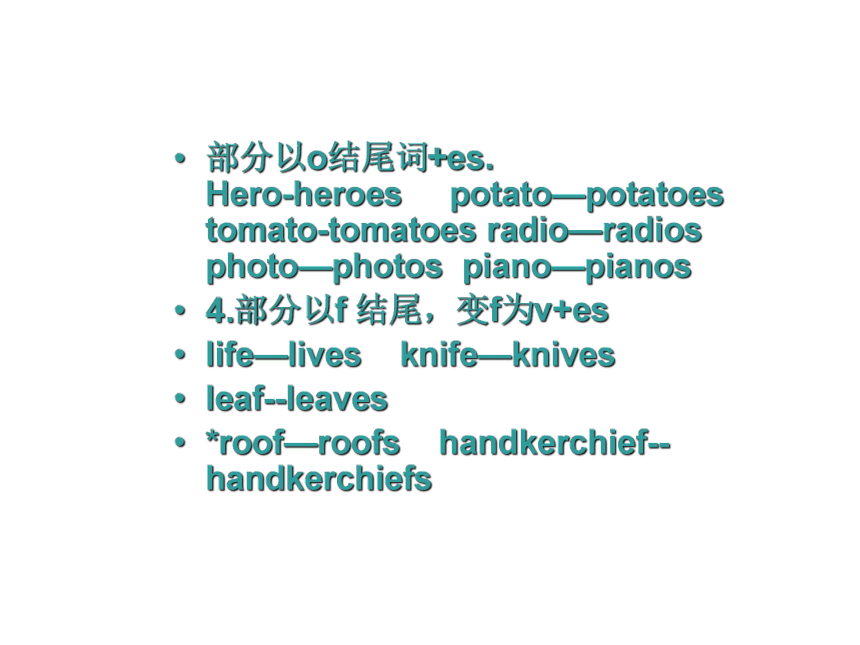
文档简介
(共130张PPT)
高中英语语法
Unit 1
一般现在时
—————
一、一般现在时的用法
1.表示经常发生的动作,存在的状态或日常习惯。常与every day ,often,always.
Sometimes 等连用。
I go to Britian every year.
I am a teacher.
2. 表示主语的性格,能力特征
The students of the universities like English very much.
My daughter sings very well.
My brother works very hard
3. 表示客观事时或普遍真理
The sun rises in the east
Two and two is four
第三人称单数的构成
1.一般在词尾加s.
Work-works live-lives play-plays
2. 以 sh.ch.s. o.结尾加-es
Wash-washes teach-teaches dress-dresses
3.以辐音自母加y结尾,变y为i加-es.
Study-studies fly-flies try-tries
一般现在时否定式
1.在be动词后加not
Are not=aren’t is not=isn’t
2.主语+don’t+动词原形。
主语+doesn’t+动词原形
Bill likes parties.
Bill doesn’t like parties
We study English hard
We don’t study English hard.
一般现在时疑问式
1. 将be动词提到句首。
He is a teacher They are students Is he teacher Are they students
2.在句首加Does 或 Do
They study English.----Do they study English
He lives in Australia.
Does he live in Australia
。
Unit2 特殊疑问句
以what. who .whom. whose .which .when where. why .how引导。除 who 外, 一般加一般疑问句式.
When does he go to bed
Where does she come from
Why do you study English
How many people are there in you family
名词性物主代词
第一人称:mine ours
第二人称:yours
第三人称:his , hers, its , theirs.
P15exercises
2. This is pen. That is ,too..3.
3.This scarf. That is too.
4.This is newspaper.That is ,too.
5.These are children. Those are ,too.
6.These are students. Those are .
感叹句
1.How+ 形容词+主谓结构( 可 省)。
How beautiful the flowers are.
2. What+ 名词单数。
What a wonderful day it is.
What+ 名词复数
What lovely children.
What exciting news.
Unit 3
名词
一.规则变化
1.在名词后+s
book-books student-students
2.以sh,ch,s,x结尾+es
class-classes inch-inches brush-brushes
3.辅音字母+y结尾,变y为i+es.
factory-factories family-families
university-universities
部分以o结尾词+es. Hero-heroes potato—potatoes tomato-tomatoes radio—radios photo—photos piano—pianos
4.部分以f 结尾,变f为v+es
life—lives knife—knives
leaf--leaves
*roof—roofs handkerchief--handkerchiefs
二。不规则变化
man—men woman—women
mouse—mice foot—feet tooth—teeth child—children deer—deer sheep—sheep
Unit 4 不定代词
1.some:用在肯定句中,修饰可数名词和不可数名词。
There is some coffee.
2.any:用于疑问句和否定句。
Is there any milk in the bottle
I haven’t got any brothers.
3.no:作定语,修饰可数不可数。
There is no sugar in the box.
Some 也用在下面疑问句中
1.Would you like some coffee
2.Will you lend me some books
二、 可数名词与不可数名词。
1.个体名词:man, teacher, student
2. 集体名词:class, team, army.
*以上两种名词属于可数名词。
3.物质名词:milk cotton air
4. 抽象名词:love happiness life
Unit 5 现在进行时
1.用法:
表示此时此刻正在进行的动作。
They are watching TV in the living room.
He is listening to the radio.
I am reading English.
2.构成
主语+be+现在分词
现在分词的构成:
1)、在动词原形后+ing.
watch-watching talk-talking
Go-going tell-telling
2).重读闭音节,末尾只有一个辅音字母,双写这一字母+ing
Win-winning sit-sitting swim-swimming begin-beginning
3)以不发音e结尾, 去e+ing.
give=-giving move-moving
Have-having take-taking
现在进行时与一般现在时的区别
一般现在时表示经常发生的动作,而现在进行时表示在此时此刻或现阶段正在进行的动作。
They always go out on Sundays, but this Sunday they are staying at home.
有些动词是不能用于现在进行时的:see
hear, like, love . Prefer, hate want need mean forget know seem believe
to be going to +动词原形
表示主观打算、看法或即将要发生的动作。
I am going to make dinner.
The football match is going to start at eight.
It is going to rain.
2.现在进行时表将来, 常用动词有:go leave come start do visit
He is not coming.
When are you going back to you factory
Mary is leaving for Paris.
We are inviting Tom to a party.
4.一般现在时表将来:表示已经安、排计划、或规定好的动作。
The train leaves at five o,clock.
The boys start school on Monday.
When does the delegation come here/
Our flight leaves at eleven thirty.
以上三种表示将来的用法比较
I am going to leave next week.
(带有主观意向)
I am leaving next week.
(已决定这样做并已安排。)
I leave next week.
(根据日程表的安排)
Unit 6一般将来时
.用法:表示纯属客观将来
2.构成:will(shall)+动词原形
You will be forty years old next year.
Tomorrow will be Sunday.
注意;shall I…… Will you…… 表示征求对方意见
Shall we have a drink
Will you pass me the cup
Unit 7 一般过去时
一、用法:表示过去某一时刻发生的动作
二、构成:主语+动词过去式
三、过去式的构成
(一)规则动词
1. 在动词后+ed
work-worked help—helped
stay-stayed call-called
2.辅音字母+ y 结尾,变y为i+ed
study-studied try-tried
3.重读闭音节,末尾只有一个辅音字母双写这一辅音字母+ed
plan-planned admit-admitted
4.以不发音e结尾,+d
arrive-arrived live-lived
倒装句
So+be/do/will/did+主语
She is French, and so am I.
They were late, and so were we.
He went to India last year, and so did she.
We will have a two-week holiday, so will
Unit 8.形容词比较级
一、用法:两者之间进行比较
二、构成:规则变化
(一) 单音节和部分双音节词
1,+er tall-taller great-greater
long-longer
2. 以e结尾只 +r
Fine-finer late-later brave-braver
.重读闭音节末尾只有一个辅音字母,双写这个辅音字母,再+er.
big-bigger hot-hotter thin-thinner
4.辅音字母+y结尾,变y为 i+er
Happy-happier busy-busier lucky-luckier
(二)、多音节和多数双音节词,在词前+more.
famous---more famous
Interesting---more interesting
difficult---more difficult
expensive---more expensive
三、不规则变化
good—better bad—worse
little—less many—more old—older far—farther ---elder
---further
注意:older的意思是较老的,说明人的年纪或事物年代的久远.
elder的意思是较年长的.
That is my elder brother.
He is two years older than I.
Farther:较远的
Further:进一步的
Tom jumps farther than I .
Have you any further news from the meeting
比较级的一些其他用法
1,The+比较级….. the+比较级 表示越来越.
The more ,the better.
The faster we go, the sooner we arrive
2.比较级+and +比较级 表示越来越
The bus ran faster and faster..
The boy is growing taller and taller.
比较级的修饰语:much a lot far a little a bit.
She is a bit taller than I.
Tom did the job far better than Mary.
The crops are growing far better than last year.
Unit 9 形容词最高级的构成
与比较级是相似的
tall-tallest brave-bravest
big-biggest clever-cleverest
happy-happiest
famous-most famous
interesting-most interesting
最高级的不规则变化
good-best bad-worst
Little-lest many much-most
Late-latest
最高级的其它用法
1.作表语时可以不加the
Cotton shirts are generally cheapest.
The light by the window is best.
2.a most 表示非常常.
It’s a most difficult question.
We spent as most happy evening.
unit 10现在完成时的构成。
主语+have(has)+ 过去分词
过去分词的构成:
1.规则动词 (1)。在动词后+ ed
work—worked look—looked
(2).以e 结尾直接+ d
arrive—arrived live—lived
辐音字母+y结尾,变y为 i+ed
现在完成时与一般过去时区别
一般过去时强调动作本身,包括时间地点。 I saw Mary an hour ago. She lost her handbag yesterday
现在完成时强调动作的结果或对现在产 生的影响。I have been to the Great wall. I have seen the film. He has lost her hey. He has gone out.
Unit 11
被动语态
一、定义:主语是谓语动词的承受者
The gate is locked at 6:00 every night.
The English test is marked by Mr.West.
二、构成:be+过去分词
1,一般现在时:am,is are +过去分词
2,一般过去时:was,were+过去分词
3,现在进行时: am,is are +being+过去分词
4, 现在完成时:have,has+ been+过去分词
5,过去完成时: had+been+过去分词
6.一般将来时:will,shall+be+过去分词
7,情态动词:情态动词+be+过去分词
三、用法
1.当不知道或不必提动作的执行者时。
The cars are made in Japan.
2.Football is played all over the world.
Printing was introduced into Europe
2.当强调动作的承受者时
Thousands of rivers are polluted in the country.
Bill Clinton was elected President of the United States of America in1993.
四、带有行为主体的被动结构(by+行为主体)
The village was destroyed by a bomb.
The printing is very valuable. It was painted by Van Gogh.
Exercise :Change the following sentences into the passive.
1.The students have invited us to a dance.
We have been invited to a dance.
2.A fire might kill the animals.
The animals might be killed by a fire.
3.The hotel is rebuilding the restaurant.
The restaurant is being rebuilt.
4.The police brought the child home.
The child was brought home.
5.His wife calls him darling.
He is called darling.
五、被动语态的补充用法。
It+被动语态+that.常用于该结构的动词有:
Say think believe agree feel know report prove suggest.
It is said that he can speak their language.
It is reported that he is still alive.
It is thought that about a million dogs are born each year.
Unit12 将来进行时
1、用法:
表示将来某时正在进行的动作。
2、构成:will shall +be+V-ing
When you arrive at the airport, a guide will be waiting for you.He will be wearing a dark green shirt.
将来完成时
1,用法:表示在将来某一时间之前已经完成的动作。常与by+时间名词连用.
2.构成:will shall +have+过去分词
I will have retired by the year 2019.
We shall have finished the work before next Friday.
You will have changed you mind by tomorrow.
Unit 13 过去进行时
一、构成:was were+过去分词
1.He wasn’t thinking about what was happening.
2.While we were having breakfast, John was talking on the phone.
二、用法:
1.表示过去某一时间进行的动作。
What were you doing yesterday at 7p.m
It was raining all the afternoon.
2. 表示一个动作发生时另一个动作正在进行。
When I came in ,he was watching TV.
Unit14:过去将来时
1.Was were going to+动词原形
It looked like that the was going to stay.
They were going to leave for Britain.
2.was were about to +动词原形
I was about to leave for a visit to Japan.
He was about to quit his job.
3.was were due to +动词原形
The BA561 was due to arrive.
4. 过去进行时表将来
I was meeting my sister at the station.
5.was were to +动词原形
He was to write his best works there.
Unit15 如何将直接引语变成
间接引语
直接引语:直接引用别人所说的话。
He said:”I like English very much”
间接引语:间接转述别人所说的话。
He said he liked English very much.
如何将直接引语变成间接引语?
1.时态的变化
现在变成过去
一般现在变成一般过去.
He said:”I am tired”
He said he was tired.
现在进行变成过去进行.
She told me ,’We are meeting him at the pub.”
She told me they were meeting him at the pub.
现在完成变成过去完成
She said;”I have waited for ages.”
She said she had waited for ages.
过去 时变成过去完成或不变。
She said:”I took it home with me.
She said she had taken it home with him
The teacher said ;”Columbus discovered America in 1492.
The teacher said Columbus discovered America in 1492.
将来时边成过去将来时
He said “I will be in Paris on Monday.”
He said he would be in Paris on Monday
2.指示代词、时间状语、地点状语的变化P62
3. 直接引语为祁使句, 变为间接引语时常用: asked sb. to do sth.
told sb. to do sth. ordered sb. to do sth.
‘Remember to turn the lights., she said.
She told me to turn off the lights.
4.直接引语为一般疑问句式+if /whether.将一般疑问句式变为正语序。
‘Is it raining ”
He asked if it was raining.
5.直接引语为特殊疑问句式,将特殊疑问句式变为正语序。
Why do you come so late
He asked me why I came so late.
Exercise:Change the following into indirect speech.
1.What time does the match start
2.Where are you going to spend your holiday
3.Who is going to buy your bike
4.Are you thirty
5.Will you be coming to the party
6.Remember to switch off all the lights.
7.I will do it tomorrow.
8.I have got many friends.
9.My son can swim very well.
10.I have been waiting for ages.
Unit 16: 动词不定式
动词不定式有两种形式:带to不定式
不带to不定式
He decided not to do it.
Let’s not decide now.
一.动词不定式时态与语态
主动语态 被动语态
一般式 : to make to be made
进行式 : to be making
完成式: to have made have been made
I am sorry to have kept you waiting.
No harm seems to have been made.
This is a day never to be forgotten.
不定式的用法
1、不定式作目的状语
The cats and dogs sleep together to keep warm.
He went to France to study French.
2.不定式作结果状语
He arrived at the cinema only to find that he had seen the film before.
He was too excited to sleep.
3.不定式作宾语
I asked to see the manager.
He wants to be left alone.
4. .不定式作宾语补足语
The doctor advised him to take a good rest.
I heard him sing in the next room.
We felt the house shake.
I will have you know that I am a qualified engineer.
注意不带的to不定式
feel sb. do sth see sb. do sth
hear sb.do sth make sb.do sth
let sb.do sth have sb.do sth
5. 疑问词+不定式
When to start hasn’t been decided.
I don’t know what/which/who to choose.
I wondered how/when/where to get in touch with him.
The difficulty is what to call our dog.
6.不定式作表语
Your mistake was to write the letter.
This house is to let.
All I did was to press the button
Unit 17.名词性从句
名词性从句即指:主语从句,宾语从句表语从句。
名词性从句引导词有两类:从属连词that whether if
疑问词who,whose,what,which,when,where,why,
how
It is true that she is an actress.(主语从句)
I know that Phillips is a good make.(宾语从句)
My idea is that we should stick our plan.(表语从句)
What I ’d really like is a remote control.(主语从句)
主语从句
That she has achieved such fame surprised her.(主语从句)
What he did is not yet known. (主语从句) How she wrote that book is a story in itself.
(主语从句)
It is said that he’s got married. (主语从句
宾语从句
I believe that you can get a good quality stereo(宾语从句)
Have you considered whether he has signed the contract. (宾语从句)
Do you have any idea of what you are looking for . (宾语从句)
表语从句
The fact is that we are behind schedule.
(表语从句)
The question is whether has signed the contract. (表语从句)
What worries me most is that my wife is still in hospital. (表语从句)
Unit 18 状语从句
1、方式状语从句:常由连词:as if as as though in a way in the way引导。
This fish isn’t cooked as I like it.
She acts as if /as though she owns the place.
Lillian was trembling as if /as though he had seen a ghost.
2.让步状语从句:常由连词:although though even if even though not that引导
Although you feel very ill right now, This is a common disease.
Though he has lived for years in London, he writes in German.
Even though the drugs are good,it is difficult to cure it with drugs alone
3.结果状语从句:常由连词so…that such…that引导.
Mr.Jones was so frightened about having an operation that she cried.
He is such a marvellous joker that you can’t help laughing.
4.目的状语从句:常由连词 so tha t in order that引导.
Ships carry lifeboats so that the crew can escape if the ship sinks.
We carved their names on the stone so that /in order that future generations might know what they had done.
If I were a bird, I would fly to you .
If there were no air, the sky would be black.
If I were you,I would plant some trees round the house.
If we didn’t go to their party next week,they would be very angry.
Unit 19虚拟语气
一、.虚拟语气
在英语中,说话人的意图不同,动词需用不同的形式;称之为语气。
虚拟语气是这些语气中一种,用以表示主观愿望和假想虚拟的情况。
1.带if 的虚拟条件句 (1).当假设与现在的事实相反时,其结构是:
If+过去式 ……主语+ would+动词原形
翻译下列句子
1.如果我英语讲的好,我就会去合资企业工作
If my English were good, I would go and work in an joint venture.
2。你处在我的地位上,你会怎么办
What would you do if you were in my place.
3.要是不再下雨,我们就去跳舞了。
If it were not raining,we would go dancing.
4。要不是正忙着打扫屋子,我会去陪你听音乐的。
If I were not busy cleaning the house, I would go and listen to the music with you.
(2)当假设与过去的事实相反时,其结构是:
if +主语+had+过去分词…..,主语+would have +过去分词.
If I had known that you were ill,I would have gone to see you.
If I had gone to the meeting last night, I would have seen her.
(3)非真实条件句主句与从句有时不一致,这叫错综条件。
If you had studied hard,you would take it easy now.
If the weather had been more favourable, the crops would be growing still better.
Wish常用虚拟语气
2。省略if 虚拟条件句
(1)在虚拟条件句中,如含有were,had,should,可把这些词放到主语前面省略if。
Were you not here, none of us would come.
Should she come here, we would discus the matter with her.
Had we had enough money, we would have bought it.
3.虚拟条件句的其他表示法
1)。不用if
Without solar radiation, animals and plants would die.
But for your help, I would have been drowned.
Without your help, I wouldn’t have achieved so much.
2) Wish+动词过去式,表示与现在事实相反
I wish I had a car.
I wish I were taller than you.
wish+ would do表示与将来事实相反
The weather is awful today, I wish it would be warmer tomorrow.
wish had done 表示与过去事实相反
I wish I hadn’t spent so much money.
3).在表示建议、命令、有求、愿望等动词后面的主语从句、宾语从句中谓语一般用should+动词原形,should可省略。要求这类从句常见的动词有:demand, desire, insist, order, recommend, require, suggest.
The doctor suggest that he have a rest.
It is suggested that trees be planted around the house.
It is desired that you finish the test on time.
The government demands that the pollution problem in the city be solved within six months.
4)在it is necessary, important, impossible, natural, strange后面的主语从句、宾语从句中,谓语一般用should+动词原形,should可省略
It is absolutely necessary that one obey the law.
It is important that the experiment results be checked.
It is natural that a child love its mother.
在as if, as though 引出的与事实不符的方式壮语从句中,从句中的谓语用过去时表示对现在情况的推测,用过去完成时表示对过去情况的推测。
The foreign experts speaks Chinese as if he were a Chinese.
She told the story as if it happened to her.
5)在It is about (high) time+ 从句中表示早该做而未做的事,从句谓语形式用过去式。
It is high time that we began to study.
It is about time I were going .
Unit 20 动名词
.动名词
动名词是非谓语动词的一种。
动名词可以在句子中作:主语、宾语、表语、定语等。
动名词可以有时态:一般式和完成式。
动名词有语态: 一般式的被动语态和完成式的被动态
1.动名词作主语
Swimming has its law.
Learning without practice is no good.
动名作主语时有时使用形式主语it
It’s no good learning without practice.
It’s worthwhile discussing the questions
2. 动名词作表语.
Our duty is making instruments.
My favourite summer sport is swimming.
3.动名词作宾语.
They began studying computer last week.
Have you finished repairing the tape recorder They got excited on hearing the good news.
有些动词常要求动名词来作宾语,这些动词有:suggest, finish, avoid, stop, can’t help, mind, enjoy, require, delay, practice, consider, excuse, escape, miss, fancy, deny, 及短语动词等。
有些动词后两者都可跟,但是意思有差别。这些动词如下:remember, forget, regret, try, stop, want 等。
remember to do sth:记住去做某事
Please remember to post the letter for me.
remember doing sth记得做过某事
I remembered posting the leter.
regret to do sth遗憾地做某事
We regret to inform you that you won’t be able to attend the class.
regret doing sth.后悔做某事
I regretted having done such a thing.
stop to do sth 停下来去做某事
Let’s stop to chat a while.
stop doing sth 停止做某事
Stop smoking, please.
try to do sth 努力去做某事
I will work hard and trr to improve .
try doing sth 试着做某事
Let’s try doing the work this way.
在英语中有些动词后要求跟不定式作宾语,这些动词主要有:want, wish, hope, continue, manage, try, ask, offer, promise, mean, pretend, intend, decide, attempt, learn, desire, agree, choose, determine, expect…等。
动名词作定语
These passage may be used as listening materials.
I have a hearing aid.
The reading room of the library is a large square hall.
动名词有语态: 一般式的被动语态和完成式的被动态
The matter is far from being solved.
Before being used the recorder should be tested.
After having been treated the water can be used for raising fish.
动名词的逻辑主语
Please excuse my interrupting you.
We all thought Xiao Wang’s giving up his job a great mistake.
Unit 21 分词
分词:
一、 分词分为现在分词和过去分词,其区别是:
1。现在分词表示正在进行,过去分词表示已经完成。
boiling water 开着的水
boiled water 开过的水
developing country 发展中国家
developed country 发达国家
2,现在分词表主动,过去分词表被动。
the exploiting people 剥削人的人
the exploited people 被剥削的人
二、句法作用
1。做表语
They are interested in music.
The news is exciting.
2.做定语
The store sells used books only.
The floating needle of a compass always points north and south.
3.做状语
Working in the plant, we learnt a lot from the workers.
Given better instructions, the watermelons could have grown bigger.
Not knowing her address, I can’t visit her personally.
When heated, ice will be changed into water.
I sat by the window, watching TV and reading books.
4.做补足语,常见的动词有find, get have hear keep make let see notice imagine
A.做宾语补足语:
We saw him going away.
All of us heard somebody singing in the next room.
We kept them waiting for a long time.
B.做主语补足语:
He was seen going away.
Somebody was heard singing in the next room.
注意分词完成时态:
Having taught English for ten years, she knows the grammar very well.
Having been given a wrong number,we couldn’t contact him over phone.
5.分词做独立主格:分词或分词短语带有自己的动作主体。
Time permitting, they will start to do a new job.
The experiment finished, we left the lab and went home.
分词与不定式在句法案上的区别:
1)作定语时的区别:
主动态分词作定语表示与谓语动作同时发生;而主动态的不定式表示在谓语动作之后发生。例如:
This is a factory producing computers.
A factory to produce computers is being built.
被动态的分词表示的动作在谓语动作之前完成;而被动态的不定式表示在谓语动作之后发生。例如:
It is one of the problems solved at the meeting.
There are many problems to be solved
作补足语时的区别:
分词和不定式作补足语都表示与谓语录同时发生,但分词强调“动作进行过程”;不定式强调“动作发生的事实”。试比较:
现在分词 不定式
I saw her doing the experiment. I saw her do the experiment.
我看见她在做实验。 我看见她在做实验。
She was seen doing experiment. She was seen to do experiment.
人们看见她在做实验。 人们看见她在做实验。
过去分词则表示动作在谓语动作之前完成。例如:
We found the work completely done.我们发现工作全做好了。
The work was found completely done.
发现工作已完全做好了。
Unit 22 定语从句。
定语从句。
一个用来修饰名词或代词的句子叫定语从句。例如:
The man who told you the news is a friend of mine.
定语从句是由关系代词和关系副词来引导的。关系代词有:who, whom, whose, which, that. 关系副词有:when, where, why 等。
1.who代替人,在从句中做主语。
Do you know the man who wrote the article
What was the name of the man who danced with you last night
2.whom代替人,在从句中做宾语
This is the boy whom we were looking for .
3.whose代替人,在从句中做定语
What is the name of the student whose father works in our lab
The building whose roof we can see from here is our department.
4.which代替 物,在从句中做主语或宾语
That was a fault which could be forgiven.
I will use the reference book which you borrowed from library。
5.that代替人或 物,在从句中做主语或宾语
Who is the man that is lecturing in the classroom.
Who is the man that talked with you
6.when表示时间,在从句中做状语。
We don’t know the exact time when we needed help.
The day will come when we will win the final victory.
7.where.表示地点,在从句中做状语
The house where we used to live has been pulled down.
8.why表示原因,在从句中做状语
Do you know the reason why he was so happy
定语从句when, where 相当于“介词+which
This is the room in which chairman Mao lived.
I will never forget the day on which I became a Party member.
注意:
1,动词+关系代词引出的定语从句
The man to whom you are talking to is the manager of the company.
The world in which we live is made of matter.
The famous professor of whom we nave often heard will come to our university .
2.名词+介词+关系代词引出的定语从句
There are nine planets in the solar system, some of which are much larger than our earth.
There are some new terms in the article,the meaning of which may be difficult to the students.
定语从句又分为两种:限制性定语从句和非限制性定语从句。注意这两种定语从句之间的区别。限制性定语录从句与先行词之间的关系密切,一旦去掉从句,主句意思不完整,甚至在逻辑上不能成立。这种从句和主句之间一般不能用逗号分开。例如:
She has a son who is a doctor.
这类从句译成中文时,要把从句译至先行词之前。“她有一位当医生的儿子”。
非限制性定语从句与先行词之间关系不密切,只是对先行词作些附加说明。本身也具有独立性。如果从句去掉,主句的意思仍然完整。从句与主句之间常用逗号隔开。在非限制性定语从句和主句之间不用that,只能用which.
非限制性定语从句有时修饰前面整个句子。例如:
The sun heats the earth, which makes it possible for plants to grow.
The most important form of energy is electric energy, which is widely used in our everyday life.
Galileo, who made the first telescope, died in 1642.
Tom passed all his examinations, which pleased his parents.
在这里which代表的是前边整个句子。
在下列情况下,用that 来代替人或物,而不用who或which.
1. 当先行词被形容词最高级所修饰时。例如:
She is the tallest girl that I know.
This is the best book that I have read.
2. 当先行词是不定代词 all, everything, anything, nothing, something …等。 例如:
She told us everything that she knew
3. 3 当先行词被 only, any, no, very 等形容词和序数词修饰时。例如:
That is the only way that leads to my home.
Please give the note to the first man that comes here.
在下列情况下省略关系代词:
1.关系代词在从句中作宾语时。例如:
I like the film (that /which) we saw yesterday.
2.关系代词在从句中作介词宾语、而介词又在句末时。例如:
Here is the key you’ve been looking for.
3. 关系代词在从句中做表语时。例如:
She is not the kind of woman you thought her to be.
谢谢大家
高中英语语法
Unit 1
一般现在时
—————
一、一般现在时的用法
1.表示经常发生的动作,存在的状态或日常习惯。常与every day ,often,always.
Sometimes 等连用。
I go to Britian every year.
I am a teacher.
2. 表示主语的性格,能力特征
The students of the universities like English very much.
My daughter sings very well.
My brother works very hard
3. 表示客观事时或普遍真理
The sun rises in the east
Two and two is four
第三人称单数的构成
1.一般在词尾加s.
Work-works live-lives play-plays
2. 以 sh.ch.s. o.结尾加-es
Wash-washes teach-teaches dress-dresses
3.以辐音自母加y结尾,变y为i加-es.
Study-studies fly-flies try-tries
一般现在时否定式
1.在be动词后加not
Are not=aren’t is not=isn’t
2.主语+don’t+动词原形。
主语+doesn’t+动词原形
Bill likes parties.
Bill doesn’t like parties
We study English hard
We don’t study English hard.
一般现在时疑问式
1. 将be动词提到句首。
He is a teacher They are students Is he teacher Are they students
2.在句首加Does 或 Do
They study English.----Do they study English
He lives in Australia.
Does he live in Australia
。
Unit2 特殊疑问句
以what. who .whom. whose .which .when where. why .how引导。除 who 外, 一般加一般疑问句式.
When does he go to bed
Where does she come from
Why do you study English
How many people are there in you family
名词性物主代词
第一人称:mine ours
第二人称:yours
第三人称:his , hers, its , theirs.
P15exercises
2. This is pen. That is ,too..3.
3.This scarf. That is too.
4.This is newspaper.That is ,too.
5.These are children. Those are ,too.
6.These are students. Those are .
感叹句
1.How+ 形容词+主谓结构( 可 省)。
How beautiful the flowers are.
2. What+ 名词单数。
What a wonderful day it is.
What+ 名词复数
What lovely children.
What exciting news.
Unit 3
名词
一.规则变化
1.在名词后+s
book-books student-students
2.以sh,ch,s,x结尾+es
class-classes inch-inches brush-brushes
3.辅音字母+y结尾,变y为i+es.
factory-factories family-families
university-universities
部分以o结尾词+es. Hero-heroes potato—potatoes tomato-tomatoes radio—radios photo—photos piano—pianos
4.部分以f 结尾,变f为v+es
life—lives knife—knives
leaf--leaves
*roof—roofs handkerchief--handkerchiefs
二。不规则变化
man—men woman—women
mouse—mice foot—feet tooth—teeth child—children deer—deer sheep—sheep
Unit 4 不定代词
1.some:用在肯定句中,修饰可数名词和不可数名词。
There is some coffee.
2.any:用于疑问句和否定句。
Is there any milk in the bottle
I haven’t got any brothers.
3.no:作定语,修饰可数不可数。
There is no sugar in the box.
Some 也用在下面疑问句中
1.Would you like some coffee
2.Will you lend me some books
二、 可数名词与不可数名词。
1.个体名词:man, teacher, student
2. 集体名词:class, team, army.
*以上两种名词属于可数名词。
3.物质名词:milk cotton air
4. 抽象名词:love happiness life
Unit 5 现在进行时
1.用法:
表示此时此刻正在进行的动作。
They are watching TV in the living room.
He is listening to the radio.
I am reading English.
2.构成
主语+be+现在分词
现在分词的构成:
1)、在动词原形后+ing.
watch-watching talk-talking
Go-going tell-telling
2).重读闭音节,末尾只有一个辅音字母,双写这一字母+ing
Win-winning sit-sitting swim-swimming begin-beginning
3)以不发音e结尾, 去e+ing.
give=-giving move-moving
Have-having take-taking
现在进行时与一般现在时的区别
一般现在时表示经常发生的动作,而现在进行时表示在此时此刻或现阶段正在进行的动作。
They always go out on Sundays, but this Sunday they are staying at home.
有些动词是不能用于现在进行时的:see
hear, like, love . Prefer, hate want need mean forget know seem believe
to be going to +动词原形
表示主观打算、看法或即将要发生的动作。
I am going to make dinner.
The football match is going to start at eight.
It is going to rain.
2.现在进行时表将来, 常用动词有:go leave come start do visit
He is not coming.
When are you going back to you factory
Mary is leaving for Paris.
We are inviting Tom to a party.
4.一般现在时表将来:表示已经安、排计划、或规定好的动作。
The train leaves at five o,clock.
The boys start school on Monday.
When does the delegation come here/
Our flight leaves at eleven thirty.
以上三种表示将来的用法比较
I am going to leave next week.
(带有主观意向)
I am leaving next week.
(已决定这样做并已安排。)
I leave next week.
(根据日程表的安排)
Unit 6一般将来时
.用法:表示纯属客观将来
2.构成:will(shall)+动词原形
You will be forty years old next year.
Tomorrow will be Sunday.
注意;shall I…… Will you…… 表示征求对方意见
Shall we have a drink
Will you pass me the cup
Unit 7 一般过去时
一、用法:表示过去某一时刻发生的动作
二、构成:主语+动词过去式
三、过去式的构成
(一)规则动词
1. 在动词后+ed
work-worked help—helped
stay-stayed call-called
2.辅音字母+ y 结尾,变y为i+ed
study-studied try-tried
3.重读闭音节,末尾只有一个辅音字母双写这一辅音字母+ed
plan-planned admit-admitted
4.以不发音e结尾,+d
arrive-arrived live-lived
倒装句
So+be/do/will/did+主语
She is French, and so am I.
They were late, and so were we.
He went to India last year, and so did she.
We will have a two-week holiday, so will
Unit 8.形容词比较级
一、用法:两者之间进行比较
二、构成:规则变化
(一) 单音节和部分双音节词
1,+er tall-taller great-greater
long-longer
2. 以e结尾只 +r
Fine-finer late-later brave-braver
.重读闭音节末尾只有一个辅音字母,双写这个辅音字母,再+er.
big-bigger hot-hotter thin-thinner
4.辅音字母+y结尾,变y为 i+er
Happy-happier busy-busier lucky-luckier
(二)、多音节和多数双音节词,在词前+more.
famous---more famous
Interesting---more interesting
difficult---more difficult
expensive---more expensive
三、不规则变化
good—better bad—worse
little—less many—more old—older far—farther ---elder
---further
注意:older的意思是较老的,说明人的年纪或事物年代的久远.
elder的意思是较年长的.
That is my elder brother.
He is two years older than I.
Farther:较远的
Further:进一步的
Tom jumps farther than I .
Have you any further news from the meeting
比较级的一些其他用法
1,The+比较级….. the+比较级 表示越来越.
The more ,the better.
The faster we go, the sooner we arrive
2.比较级+and +比较级 表示越来越
The bus ran faster and faster..
The boy is growing taller and taller.
比较级的修饰语:much a lot far a little a bit.
She is a bit taller than I.
Tom did the job far better than Mary.
The crops are growing far better than last year.
Unit 9 形容词最高级的构成
与比较级是相似的
tall-tallest brave-bravest
big-biggest clever-cleverest
happy-happiest
famous-most famous
interesting-most interesting
最高级的不规则变化
good-best bad-worst
Little-lest many much-most
Late-latest
最高级的其它用法
1.作表语时可以不加the
Cotton shirts are generally cheapest.
The light by the window is best.
2.a most 表示非常常.
It’s a most difficult question.
We spent as most happy evening.
unit 10现在完成时的构成。
主语+have(has)+ 过去分词
过去分词的构成:
1.规则动词 (1)。在动词后+ ed
work—worked look—looked
(2).以e 结尾直接+ d
arrive—arrived live—lived
辐音字母+y结尾,变y为 i+ed
现在完成时与一般过去时区别
一般过去时强调动作本身,包括时间地点。 I saw Mary an hour ago. She lost her handbag yesterday
现在完成时强调动作的结果或对现在产 生的影响。I have been to the Great wall. I have seen the film. He has lost her hey. He has gone out.
Unit 11
被动语态
一、定义:主语是谓语动词的承受者
The gate is locked at 6:00 every night.
The English test is marked by Mr.West.
二、构成:be+过去分词
1,一般现在时:am,is are +过去分词
2,一般过去时:was,were+过去分词
3,现在进行时: am,is are +being+过去分词
4, 现在完成时:have,has+ been+过去分词
5,过去完成时: had+been+过去分词
6.一般将来时:will,shall+be+过去分词
7,情态动词:情态动词+be+过去分词
三、用法
1.当不知道或不必提动作的执行者时。
The cars are made in Japan.
2.Football is played all over the world.
Printing was introduced into Europe
2.当强调动作的承受者时
Thousands of rivers are polluted in the country.
Bill Clinton was elected President of the United States of America in1993.
四、带有行为主体的被动结构(by+行为主体)
The village was destroyed by a bomb.
The printing is very valuable. It was painted by Van Gogh.
Exercise :Change the following sentences into the passive.
1.The students have invited us to a dance.
We have been invited to a dance.
2.A fire might kill the animals.
The animals might be killed by a fire.
3.The hotel is rebuilding the restaurant.
The restaurant is being rebuilt.
4.The police brought the child home.
The child was brought home.
5.His wife calls him darling.
He is called darling.
五、被动语态的补充用法。
It+被动语态+that.常用于该结构的动词有:
Say think believe agree feel know report prove suggest.
It is said that he can speak their language.
It is reported that he is still alive.
It is thought that about a million dogs are born each year.
Unit12 将来进行时
1、用法:
表示将来某时正在进行的动作。
2、构成:will shall +be+V-ing
When you arrive at the airport, a guide will be waiting for you.He will be wearing a dark green shirt.
将来完成时
1,用法:表示在将来某一时间之前已经完成的动作。常与by+时间名词连用.
2.构成:will shall +have+过去分词
I will have retired by the year 2019.
We shall have finished the work before next Friday.
You will have changed you mind by tomorrow.
Unit 13 过去进行时
一、构成:was were+过去分词
1.He wasn’t thinking about what was happening.
2.While we were having breakfast, John was talking on the phone.
二、用法:
1.表示过去某一时间进行的动作。
What were you doing yesterday at 7p.m
It was raining all the afternoon.
2. 表示一个动作发生时另一个动作正在进行。
When I came in ,he was watching TV.
Unit14:过去将来时
1.Was were going to+动词原形
It looked like that the was going to stay.
They were going to leave for Britain.
2.was were about to +动词原形
I was about to leave for a visit to Japan.
He was about to quit his job.
3.was were due to +动词原形
The BA561 was due to arrive.
4. 过去进行时表将来
I was meeting my sister at the station.
5.was were to +动词原形
He was to write his best works there.
Unit15 如何将直接引语变成
间接引语
直接引语:直接引用别人所说的话。
He said:”I like English very much”
间接引语:间接转述别人所说的话。
He said he liked English very much.
如何将直接引语变成间接引语?
1.时态的变化
现在变成过去
一般现在变成一般过去.
He said:”I am tired”
He said he was tired.
现在进行变成过去进行.
She told me ,’We are meeting him at the pub.”
She told me they were meeting him at the pub.
现在完成变成过去完成
She said;”I have waited for ages.”
She said she had waited for ages.
过去 时变成过去完成或不变。
She said:”I took it home with me.
She said she had taken it home with him
The teacher said ;”Columbus discovered America in 1492.
The teacher said Columbus discovered America in 1492.
将来时边成过去将来时
He said “I will be in Paris on Monday.”
He said he would be in Paris on Monday
2.指示代词、时间状语、地点状语的变化P62
3. 直接引语为祁使句, 变为间接引语时常用: asked sb. to do sth.
told sb. to do sth. ordered sb. to do sth.
‘Remember to turn the lights., she said.
She told me to turn off the lights.
4.直接引语为一般疑问句式+if /whether.将一般疑问句式变为正语序。
‘Is it raining ”
He asked if it was raining.
5.直接引语为特殊疑问句式,将特殊疑问句式变为正语序。
Why do you come so late
He asked me why I came so late.
Exercise:Change the following into indirect speech.
1.What time does the match start
2.Where are you going to spend your holiday
3.Who is going to buy your bike
4.Are you thirty
5.Will you be coming to the party
6.Remember to switch off all the lights.
7.I will do it tomorrow.
8.I have got many friends.
9.My son can swim very well.
10.I have been waiting for ages.
Unit 16: 动词不定式
动词不定式有两种形式:带to不定式
不带to不定式
He decided not to do it.
Let’s not decide now.
一.动词不定式时态与语态
主动语态 被动语态
一般式 : to make to be made
进行式 : to be making
完成式: to have made have been made
I am sorry to have kept you waiting.
No harm seems to have been made.
This is a day never to be forgotten.
不定式的用法
1、不定式作目的状语
The cats and dogs sleep together to keep warm.
He went to France to study French.
2.不定式作结果状语
He arrived at the cinema only to find that he had seen the film before.
He was too excited to sleep.
3.不定式作宾语
I asked to see the manager.
He wants to be left alone.
4. .不定式作宾语补足语
The doctor advised him to take a good rest.
I heard him sing in the next room.
We felt the house shake.
I will have you know that I am a qualified engineer.
注意不带的to不定式
feel sb. do sth see sb. do sth
hear sb.do sth make sb.do sth
let sb.do sth have sb.do sth
5. 疑问词+不定式
When to start hasn’t been decided.
I don’t know what/which/who to choose.
I wondered how/when/where to get in touch with him.
The difficulty is what to call our dog.
6.不定式作表语
Your mistake was to write the letter.
This house is to let.
All I did was to press the button
Unit 17.名词性从句
名词性从句即指:主语从句,宾语从句表语从句。
名词性从句引导词有两类:从属连词that whether if
疑问词who,whose,what,which,when,where,why,
how
It is true that she is an actress.(主语从句)
I know that Phillips is a good make.(宾语从句)
My idea is that we should stick our plan.(表语从句)
What I ’d really like is a remote control.(主语从句)
主语从句
That she has achieved such fame surprised her.(主语从句)
What he did is not yet known. (主语从句) How she wrote that book is a story in itself.
(主语从句)
It is said that he’s got married. (主语从句
宾语从句
I believe that you can get a good quality stereo(宾语从句)
Have you considered whether he has signed the contract. (宾语从句)
Do you have any idea of what you are looking for . (宾语从句)
表语从句
The fact is that we are behind schedule.
(表语从句)
The question is whether has signed the contract. (表语从句)
What worries me most is that my wife is still in hospital. (表语从句)
Unit 18 状语从句
1、方式状语从句:常由连词:as if as as though in a way in the way引导。
This fish isn’t cooked as I like it.
She acts as if /as though she owns the place.
Lillian was trembling as if /as though he had seen a ghost.
2.让步状语从句:常由连词:although though even if even though not that引导
Although you feel very ill right now, This is a common disease.
Though he has lived for years in London, he writes in German.
Even though the drugs are good,it is difficult to cure it with drugs alone
3.结果状语从句:常由连词so…that such…that引导.
Mr.Jones was so frightened about having an operation that she cried.
He is such a marvellous joker that you can’t help laughing.
4.目的状语从句:常由连词 so tha t in order that引导.
Ships carry lifeboats so that the crew can escape if the ship sinks.
We carved their names on the stone so that /in order that future generations might know what they had done.
If I were a bird, I would fly to you .
If there were no air, the sky would be black.
If I were you,I would plant some trees round the house.
If we didn’t go to their party next week,they would be very angry.
Unit 19虚拟语气
一、.虚拟语气
在英语中,说话人的意图不同,动词需用不同的形式;称之为语气。
虚拟语气是这些语气中一种,用以表示主观愿望和假想虚拟的情况。
1.带if 的虚拟条件句 (1).当假设与现在的事实相反时,其结构是:
If+过去式 ……主语+ would+动词原形
翻译下列句子
1.如果我英语讲的好,我就会去合资企业工作
If my English were good, I would go and work in an joint venture.
2。你处在我的地位上,你会怎么办
What would you do if you were in my place.
3.要是不再下雨,我们就去跳舞了。
If it were not raining,we would go dancing.
4。要不是正忙着打扫屋子,我会去陪你听音乐的。
If I were not busy cleaning the house, I would go and listen to the music with you.
(2)当假设与过去的事实相反时,其结构是:
if +主语+had+过去分词…..,主语+would have +过去分词.
If I had known that you were ill,I would have gone to see you.
If I had gone to the meeting last night, I would have seen her.
(3)非真实条件句主句与从句有时不一致,这叫错综条件。
If you had studied hard,you would take it easy now.
If the weather had been more favourable, the crops would be growing still better.
Wish常用虚拟语气
2。省略if 虚拟条件句
(1)在虚拟条件句中,如含有were,had,should,可把这些词放到主语前面省略if。
Were you not here, none of us would come.
Should she come here, we would discus the matter with her.
Had we had enough money, we would have bought it.
3.虚拟条件句的其他表示法
1)。不用if
Without solar radiation, animals and plants would die.
But for your help, I would have been drowned.
Without your help, I wouldn’t have achieved so much.
2) Wish+动词过去式,表示与现在事实相反
I wish I had a car.
I wish I were taller than you.
wish+ would do表示与将来事实相反
The weather is awful today, I wish it would be warmer tomorrow.
wish had done 表示与过去事实相反
I wish I hadn’t spent so much money.
3).在表示建议、命令、有求、愿望等动词后面的主语从句、宾语从句中谓语一般用should+动词原形,should可省略。要求这类从句常见的动词有:demand, desire, insist, order, recommend, require, suggest.
The doctor suggest that he have a rest.
It is suggested that trees be planted around the house.
It is desired that you finish the test on time.
The government demands that the pollution problem in the city be solved within six months.
4)在it is necessary, important, impossible, natural, strange后面的主语从句、宾语从句中,谓语一般用should+动词原形,should可省略
It is absolutely necessary that one obey the law.
It is important that the experiment results be checked.
It is natural that a child love its mother.
在as if, as though 引出的与事实不符的方式壮语从句中,从句中的谓语用过去时表示对现在情况的推测,用过去完成时表示对过去情况的推测。
The foreign experts speaks Chinese as if he were a Chinese.
She told the story as if it happened to her.
5)在It is about (high) time+ 从句中表示早该做而未做的事,从句谓语形式用过去式。
It is high time that we began to study.
It is about time I were going .
Unit 20 动名词
.动名词
动名词是非谓语动词的一种。
动名词可以在句子中作:主语、宾语、表语、定语等。
动名词可以有时态:一般式和完成式。
动名词有语态: 一般式的被动语态和完成式的被动态
1.动名词作主语
Swimming has its law.
Learning without practice is no good.
动名作主语时有时使用形式主语it
It’s no good learning without practice.
It’s worthwhile discussing the questions
2. 动名词作表语.
Our duty is making instruments.
My favourite summer sport is swimming.
3.动名词作宾语.
They began studying computer last week.
Have you finished repairing the tape recorder They got excited on hearing the good news.
有些动词常要求动名词来作宾语,这些动词有:suggest, finish, avoid, stop, can’t help, mind, enjoy, require, delay, practice, consider, excuse, escape, miss, fancy, deny, 及短语动词等。
有些动词后两者都可跟,但是意思有差别。这些动词如下:remember, forget, regret, try, stop, want 等。
remember to do sth:记住去做某事
Please remember to post the letter for me.
remember doing sth记得做过某事
I remembered posting the leter.
regret to do sth遗憾地做某事
We regret to inform you that you won’t be able to attend the class.
regret doing sth.后悔做某事
I regretted having done such a thing.
stop to do sth 停下来去做某事
Let’s stop to chat a while.
stop doing sth 停止做某事
Stop smoking, please.
try to do sth 努力去做某事
I will work hard and trr to improve .
try doing sth 试着做某事
Let’s try doing the work this way.
在英语中有些动词后要求跟不定式作宾语,这些动词主要有:want, wish, hope, continue, manage, try, ask, offer, promise, mean, pretend, intend, decide, attempt, learn, desire, agree, choose, determine, expect…等。
动名词作定语
These passage may be used as listening materials.
I have a hearing aid.
The reading room of the library is a large square hall.
动名词有语态: 一般式的被动语态和完成式的被动态
The matter is far from being solved.
Before being used the recorder should be tested.
After having been treated the water can be used for raising fish.
动名词的逻辑主语
Please excuse my interrupting you.
We all thought Xiao Wang’s giving up his job a great mistake.
Unit 21 分词
分词:
一、 分词分为现在分词和过去分词,其区别是:
1。现在分词表示正在进行,过去分词表示已经完成。
boiling water 开着的水
boiled water 开过的水
developing country 发展中国家
developed country 发达国家
2,现在分词表主动,过去分词表被动。
the exploiting people 剥削人的人
the exploited people 被剥削的人
二、句法作用
1。做表语
They are interested in music.
The news is exciting.
2.做定语
The store sells used books only.
The floating needle of a compass always points north and south.
3.做状语
Working in the plant, we learnt a lot from the workers.
Given better instructions, the watermelons could have grown bigger.
Not knowing her address, I can’t visit her personally.
When heated, ice will be changed into water.
I sat by the window, watching TV and reading books.
4.做补足语,常见的动词有find, get have hear keep make let see notice imagine
A.做宾语补足语:
We saw him going away.
All of us heard somebody singing in the next room.
We kept them waiting for a long time.
B.做主语补足语:
He was seen going away.
Somebody was heard singing in the next room.
注意分词完成时态:
Having taught English for ten years, she knows the grammar very well.
Having been given a wrong number,we couldn’t contact him over phone.
5.分词做独立主格:分词或分词短语带有自己的动作主体。
Time permitting, they will start to do a new job.
The experiment finished, we left the lab and went home.
分词与不定式在句法案上的区别:
1)作定语时的区别:
主动态分词作定语表示与谓语动作同时发生;而主动态的不定式表示在谓语动作之后发生。例如:
This is a factory producing computers.
A factory to produce computers is being built.
被动态的分词表示的动作在谓语动作之前完成;而被动态的不定式表示在谓语动作之后发生。例如:
It is one of the problems solved at the meeting.
There are many problems to be solved
作补足语时的区别:
分词和不定式作补足语都表示与谓语录同时发生,但分词强调“动作进行过程”;不定式强调“动作发生的事实”。试比较:
现在分词 不定式
I saw her doing the experiment. I saw her do the experiment.
我看见她在做实验。 我看见她在做实验。
She was seen doing experiment. She was seen to do experiment.
人们看见她在做实验。 人们看见她在做实验。
过去分词则表示动作在谓语动作之前完成。例如:
We found the work completely done.我们发现工作全做好了。
The work was found completely done.
发现工作已完全做好了。
Unit 22 定语从句。
定语从句。
一个用来修饰名词或代词的句子叫定语从句。例如:
The man who told you the news is a friend of mine.
定语从句是由关系代词和关系副词来引导的。关系代词有:who, whom, whose, which, that. 关系副词有:when, where, why 等。
1.who代替人,在从句中做主语。
Do you know the man who wrote the article
What was the name of the man who danced with you last night
2.whom代替人,在从句中做宾语
This is the boy whom we were looking for .
3.whose代替人,在从句中做定语
What is the name of the student whose father works in our lab
The building whose roof we can see from here is our department.
4.which代替 物,在从句中做主语或宾语
That was a fault which could be forgiven.
I will use the reference book which you borrowed from library。
5.that代替人或 物,在从句中做主语或宾语
Who is the man that is lecturing in the classroom.
Who is the man that talked with you
6.when表示时间,在从句中做状语。
We don’t know the exact time when we needed help.
The day will come when we will win the final victory.
7.where.表示地点,在从句中做状语
The house where we used to live has been pulled down.
8.why表示原因,在从句中做状语
Do you know the reason why he was so happy
定语从句when, where 相当于“介词+which
This is the room in which chairman Mao lived.
I will never forget the day on which I became a Party member.
注意:
1,动词+关系代词引出的定语从句
The man to whom you are talking to is the manager of the company.
The world in which we live is made of matter.
The famous professor of whom we nave often heard will come to our university .
2.名词+介词+关系代词引出的定语从句
There are nine planets in the solar system, some of which are much larger than our earth.
There are some new terms in the article,the meaning of which may be difficult to the students.
定语从句又分为两种:限制性定语从句和非限制性定语从句。注意这两种定语从句之间的区别。限制性定语录从句与先行词之间的关系密切,一旦去掉从句,主句意思不完整,甚至在逻辑上不能成立。这种从句和主句之间一般不能用逗号分开。例如:
She has a son who is a doctor.
这类从句译成中文时,要把从句译至先行词之前。“她有一位当医生的儿子”。
非限制性定语从句与先行词之间关系不密切,只是对先行词作些附加说明。本身也具有独立性。如果从句去掉,主句的意思仍然完整。从句与主句之间常用逗号隔开。在非限制性定语从句和主句之间不用that,只能用which.
非限制性定语从句有时修饰前面整个句子。例如:
The sun heats the earth, which makes it possible for plants to grow.
The most important form of energy is electric energy, which is widely used in our everyday life.
Galileo, who made the first telescope, died in 1642.
Tom passed all his examinations, which pleased his parents.
在这里which代表的是前边整个句子。
在下列情况下,用that 来代替人或物,而不用who或which.
1. 当先行词被形容词最高级所修饰时。例如:
She is the tallest girl that I know.
This is the best book that I have read.
2. 当先行词是不定代词 all, everything, anything, nothing, something …等。 例如:
She told us everything that she knew
3. 3 当先行词被 only, any, no, very 等形容词和序数词修饰时。例如:
That is the only way that leads to my home.
Please give the note to the first man that comes here.
在下列情况下省略关系代词:
1.关系代词在从句中作宾语时。例如:
I like the film (that /which) we saw yesterday.
2.关系代词在从句中作介词宾语、而介词又在句末时。例如:
Here is the key you’ve been looking for.
3. 关系代词在从句中做表语时。例如:
She is not the kind of woman you thought her to be.
谢谢大家
